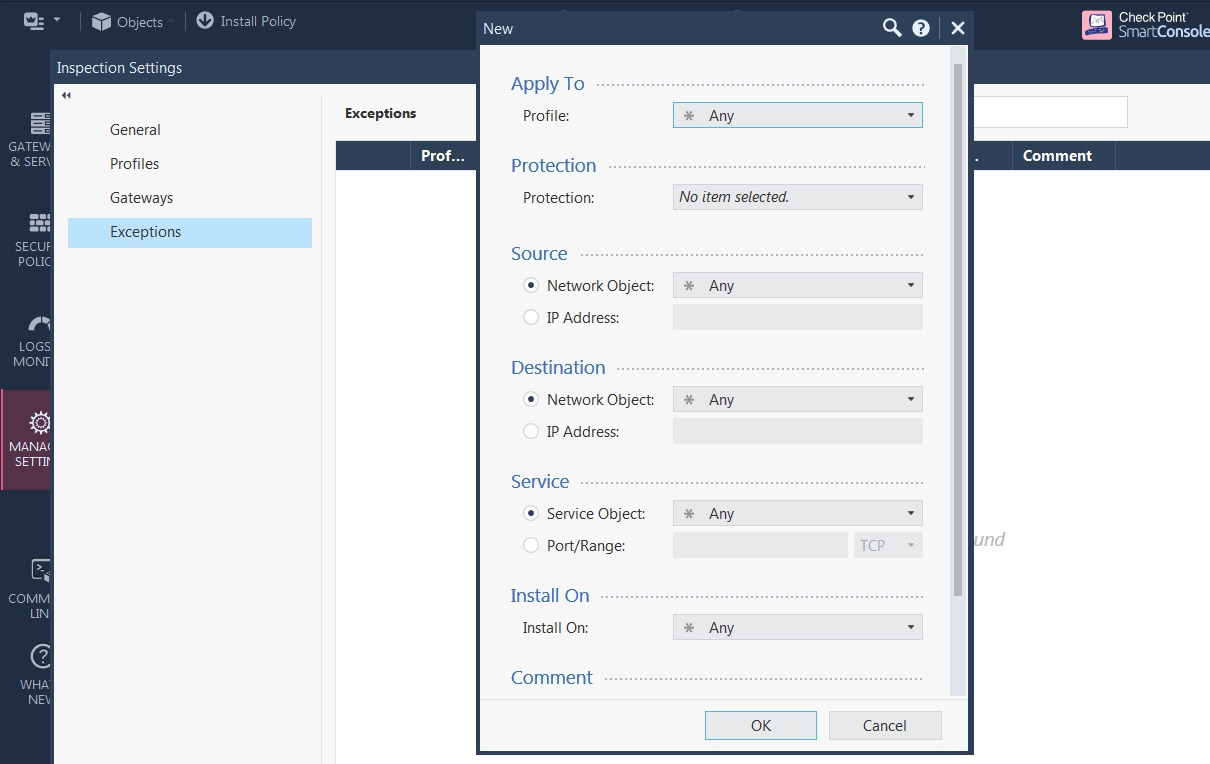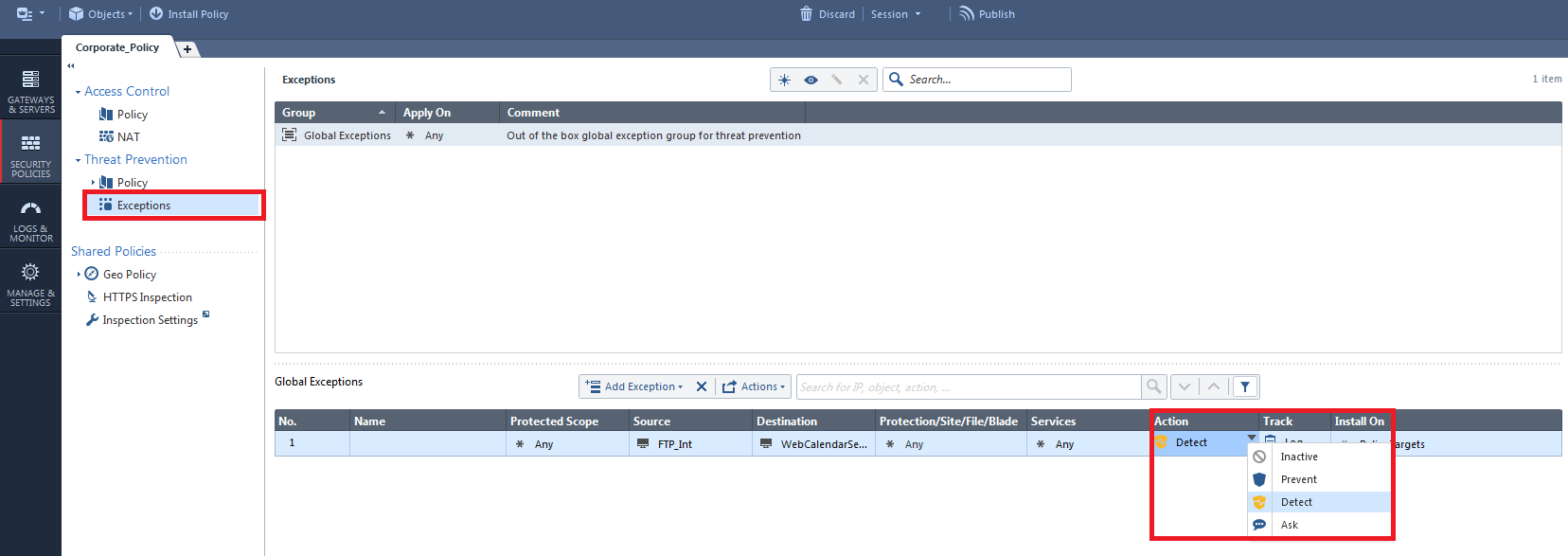- Products
Network & SASE IoT Protect Maestro Management OpenTelemetry/Skyline Remote Access VPN SASE SD-WAN Security Gateways SmartMove Smart-1 Cloud SMB Gateways (Spark) Threat PreventionCloud Cloud Network Security CloudMates General CloudGuard - WAF Talking Cloud Podcast Weekly ReportsSecurity Operations Events External Risk Management Incident Response Infinity AI Infinity Portal NDR Playblocks SOC XDR/XPR Threat Exposure Management
- Learn
- Local User Groups
- Partners
- More
This website uses Cookies. Click Accept to agree to our website's cookie use as described in our Privacy Policy. Click Preferences to customize your cookie settings.
- Products
- AI Security
- Developers & More
- Check Point Trivia
- CheckMates Toolbox
- General Topics
- Products Announcements
- Threat Prevention Blog
- Upcoming Events
- Americas
- EMEA
- Czech Republic and Slovakia
- Denmark
- Netherlands
- Germany
- Sweden
- United Kingdom and Ireland
- France
- Spain
- Norway
- Ukraine
- Baltics and Finland
- Greece
- Portugal
- Austria
- Kazakhstan and CIS
- Switzerland
- Romania
- Turkey
- Belarus
- Belgium & Luxembourg
- Russia
- Poland
- Georgia
- DACH - Germany, Austria and Switzerland
- Iberia
- Africa
- Adriatics Region
- Eastern Africa
- Israel
- Nordics
- Middle East and Africa
- Balkans
- Italy
- Bulgaria
- Cyprus
- APAC
CheckMates Fest 2026
Join the Celebration!
AI Security Masters
E1: How AI is Reshaping Our World
MVP 2026: Submissions
Are Now Open!
What's New in R82.10?
Watch NowOverlap in Security Validation
Help us to understand your needs better
CheckMates Go:
R82.10 and Rationalizing Multi Vendor Security Policies
Turn on suggestions
Auto-suggest helps you quickly narrow down your search results by suggesting possible matches as you type.
Showing results for
- CheckMates
- :
- Products
- :
- Network & SASE
- :
- Threat Prevention
- :
- Re: IPS exception for pre R80 gateways with R80 SM...
Options
- Subscribe to RSS Feed
- Mark Topic as New
- Mark Topic as Read
- Float this Topic for Current User
- Bookmark
- Subscribe
- Mute
- Printer Friendly Page
Turn on suggestions
Auto-suggest helps you quickly narrow down your search results by suggesting possible matches as you type.
Showing results for
Are you a member of CheckMates?
×
Sign in with your Check Point UserCenter/PartnerMap account to access more great content and get a chance to win some Apple AirPods! If you don't have an account, create one now for free!
- Mark as New
- Bookmark
- Subscribe
- Mute
- Subscribe to RSS Feed
- Permalink
- Report Inappropriate Content
IPS exception for pre R80 gateways with R80 SMS
Hello guys,
I have a question regarding the IPS exception possibilites for threat prevention profiles within a R80 SMS that is applied to pre R80 gateways. To be precise; the gateways in this case are running R76.50 (scalable platform release). As far as I've seen it is only possible to configure exceptions in the threat prevention exceptions tab - and here I realized that the action for any exceptions that need to be applied to pre R80 gateways is "inactive". But with that in place I am not able to see anything in my logs as IPS checking is just not done on the specific traffic described in the threat prevention exception rule. Now my question is - am I missing something or is there really no chance to configure "detect", so that IPS logs are still being received for the exception? I personally do not want to just ignore it in the first place. My plan is to have the SIEM team check whether its a false positive (during this time I want the detect option) and after confirming the false positive its fine for me to just set the action to "inactive".
Thanks in advance for any advices!
Best regards,
Maik
7 Replies
- Mark as New
- Bookmark
- Subscribe
- Mute
- Subscribe to RSS Feed
- Permalink
- Report Inappropriate Content
As the name already hints to, an IPS exception excludes traffic from IPS. IPS set to detect consumes the same ressources as when in protect mode, so it makes no sense to detect anything except in the first weeks of getting IPS into production.
CCSP - CCSE / CCTE / CTPS / CCME / CCSM Elite / SMB Specialist
- Mark as New
- Bookmark
- Subscribe
- Mute
- Subscribe to RSS Feed
- Permalink
- Report Inappropriate Content
Hello Günther,
Thanks for your reply. I understand IPS exceptions in the way that you have some kind of exclusion (differences) regarding the standard profile settings for specific traffic/signatures. Not in the way, that this automatically means you want to exclude such traffic completely from the IPS point of view.
That being said, I think it makes sense to detect something in this case as we are performing a restructure of the network (for some parts) and therefore need the detect just for specific sources, destinations & signatures. As these aren't that many hosts a new profile does not make much sense (which could have been another option).
- Mark as New
- Bookmark
- Subscribe
- Mute
- Subscribe to RSS Feed
- Permalink
- Report Inappropriate Content
You seem to understand IPS exceptions in a wrong way 😞 this is used for traffic that shall not be inspected at all by IPS (only very basic testing, e.g. Anti-Spoofing is performed in fw chain). If you need to detect traffic, use a special profile for this kind of traffic to make it work and log in detect mode.
CCSP - CCSE / CCTE / CTPS / CCME / CCSM Elite / SMB Specialist
- Mark as New
- Bookmark
- Subscribe
- Mute
- Subscribe to RSS Feed
- Permalink
- Report Inappropriate Content
Hm, I am wondering why there is the possibility for R80.x gateways to have the options of "inactive", "detect", "prevent" and "ask" within the exception action settings then. Nevertheless, thanks for the information regarding the impact on the fw chain and what is still done after specifying an exception - was not aware of that.
- Mark as New
- Bookmark
- Subscribe
- Mute
- Subscribe to RSS Feed
- Permalink
- Report Inappropriate Content
The options of "inactive", "detect", "prevent" and "ask" within the exception action settings - I can not see that here:

CCSP - CCSE / CCTE / CTPS / CCME / CCSM Elite / SMB Specialist
- Mark as New
- Bookmark
- Subscribe
- Mute
- Subscribe to RSS Feed
- Permalink
- Report Inappropriate Content

I am talking about the exception policy settings right below the actual threat prevention policies within the SmartConsole. [The hosts and rule shown in the screenshot are based on a cloud demo session]
Edit: Am I missing something? If yes, what exactly?
- Mark as New
- Bookmark
- Subscribe
- Mute
- Subscribe to RSS Feed
- Permalink
- Report Inappropriate Content
This exception does not apply for pre-R80 gateways.
The exceptions you configure in the threat prevention exceptions tab are for excluding traffic from IPS entirely, not applying a different action to the traffic.
R80.x gateways have significantly more flexibility with regards to IPS profiles, exceptions, and so on.
Leaderboard
Epsum factorial non deposit quid pro quo hic escorol.
Upcoming Events
Thu 08 Jan 2026 @ 05:00 PM (CET)
AI Security Masters Session 1: How AI is Reshaping Our WorldFri 09 Jan 2026 @ 10:00 AM (CET)
CheckMates Live Netherlands - Sessie 42: Looking back & forwardThu 22 Jan 2026 @ 05:00 PM (CET)
AI Security Masters Session 2: Hacking with AI: The Dark Side of InnovationThu 12 Feb 2026 @ 05:00 PM (CET)
AI Security Masters Session 3: Exposing AI Vulnerabilities: CP<R> Latest Security FindingsThu 26 Feb 2026 @ 05:00 PM (CET)
AI Security Masters Session 4: Powering Prevention: The AI Driving Check Point’s ThreatCloudThu 08 Jan 2026 @ 05:00 PM (CET)
AI Security Masters Session 1: How AI is Reshaping Our WorldFri 09 Jan 2026 @ 10:00 AM (CET)
CheckMates Live Netherlands - Sessie 42: Looking back & forwardThu 22 Jan 2026 @ 05:00 PM (CET)
AI Security Masters Session 2: Hacking with AI: The Dark Side of InnovationThu 26 Feb 2026 @ 05:00 PM (CET)
AI Security Masters Session 4: Powering Prevention: The AI Driving Check Point’s ThreatCloudAbout CheckMates
Learn Check Point
Advanced Learning
YOU DESERVE THE BEST SECURITY
©1994-2025 Check Point Software Technologies Ltd. All rights reserved.
Copyright
Privacy Policy
About Us
UserCenter


